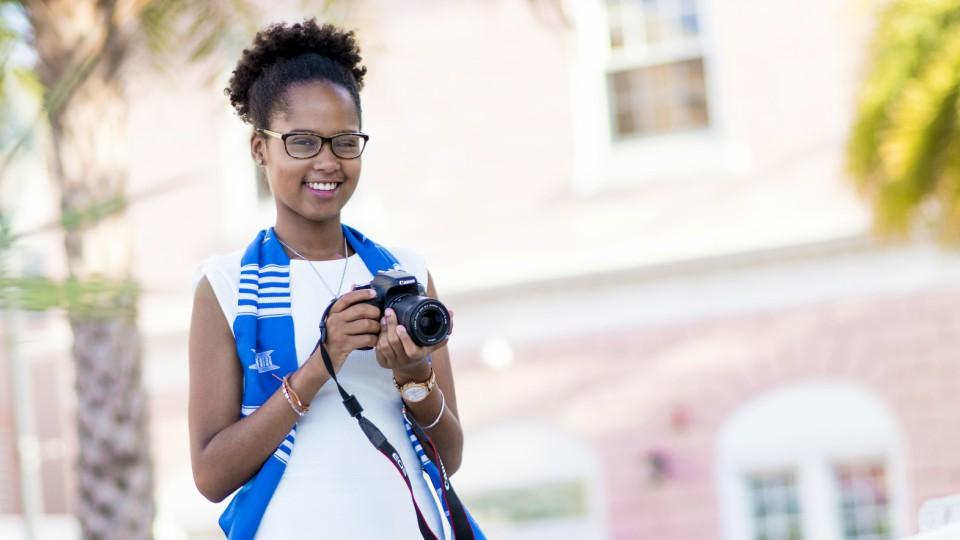Getting started on MA Race, Media & Social Justice
Primary page content
The MA Race, Media & Social Justice is new for 2017 at Goldsmiths, University of London, and has attracted students from a variety of backgrounds with a huge range of experience.

Jasper Williams
One such student is Jasper Williams, who has moved from The Bahamas to study at Goldsmiths and has a passion for media and human rights.
I spoke to her at the start of the new term to discuss the course, what attracted her to Goldsmiths, and issues of racial representation in the media.
Chris Smith: Tell us a little about your story and how you came to study at Goldsmiths...
Jasper Williams: In 2014, I began to volunteer with Grand Bahama Human Rights Association, a local human rights group in The Bahamas, and it was here that I was first exposed to the injustices faced by one of the most marginalized groups in The Bahamas: 'poor blacks' (both Bahamian and non-Bahamian alike). I began to witness how many migrants and citizens of The Bahamas were often denied access to opportunities because of their race or class passed onto them by their colonial ancestry. This led to my development of an interest in depiction of Afro-Caribbean minorities in society as well as the media.
While completing my undergraduate degree at the University of The Bahamas (UB), I based my senior research project on the portrayal of Haitians, the largest migrant group in The Bahamas, in local print media before and after the implementation of a controversial immigration policy in November 2014. A mentor at UB recommended that I not only continue this line of research, but also consider applying for a new programme at Goldsmiths which would allow me to further develop my qualitative skills and possibly be a leader in race/media research in The Bahamas.
CS: What appealed to you about the MA Race, Media & Social Justice course?
JW: It stood out because not only were the professors the leaders in their fields, but the programme tackled contemporary debates surrounding race and ethnicity from both a media and sociological perspective, which I found unique. Also, the programme aims to equip students with the necessary skills to understand the representation of race and ethnicity in media with focus on post-colonial and critical race theories. Coming from a post-colonial Afro-Caribbean country, I was particularly intrigued by this, because it would give me the theoretical tools to understand how the often negative portrayal of 'poor blacks' in Bahamian and Caribbean media can foster stigmatization.
CS: How important is it that courses like this continue to be offered to students?
JW: Extremely. Too often we forget about the power of the media in shaping the ideas and thoughts of society. This course explores how, in some instances, the media gives power to racism, as well as the idea of race as it relates to social justice in the contemporary moment. Not only does it provide students with a fundamental understanding of post-colonial and race critical theories, but it also encourages them to join and challenge the academic debates surrounding the current representation of minorities in the media internationally.
CS: What do you think are the biggest challenges facing people of colour in the media today?
JW: The lack of fair representation. I should note that when I refer to representation, I don't solely mean there is a lack of people of colour in the media itself, but rather a lack of diversity in the ways they are portrayed. Often, West Indians (e.g. Bahamians, Trinidadians, Bajans) are depicted with dreadlocks and Jamaican accents, while Arabs are portrayed as Muslim extremists or as oppressive misogynists. Such inaccurate representations feed stereotypes and encourage the mistreatment of people of colour.
CS: What would you like to do after completing this course?
JW: My ultimate goal is to pursue doctoral research in media and cultural studies towards a career in academia, or possibly with a civil society in the area of human rights related media. Not only will obtaining the doctorate allow me to work at the forefront of my field, it will also be a significant personal achievement as I will be the first in my family to achieve a postgraduate degree at this level. Perhaps the most significant reason for engaging in this area of research, aside from my passion for the topic, is the limited body of media and race research and scholarship in and about The Bahamas.